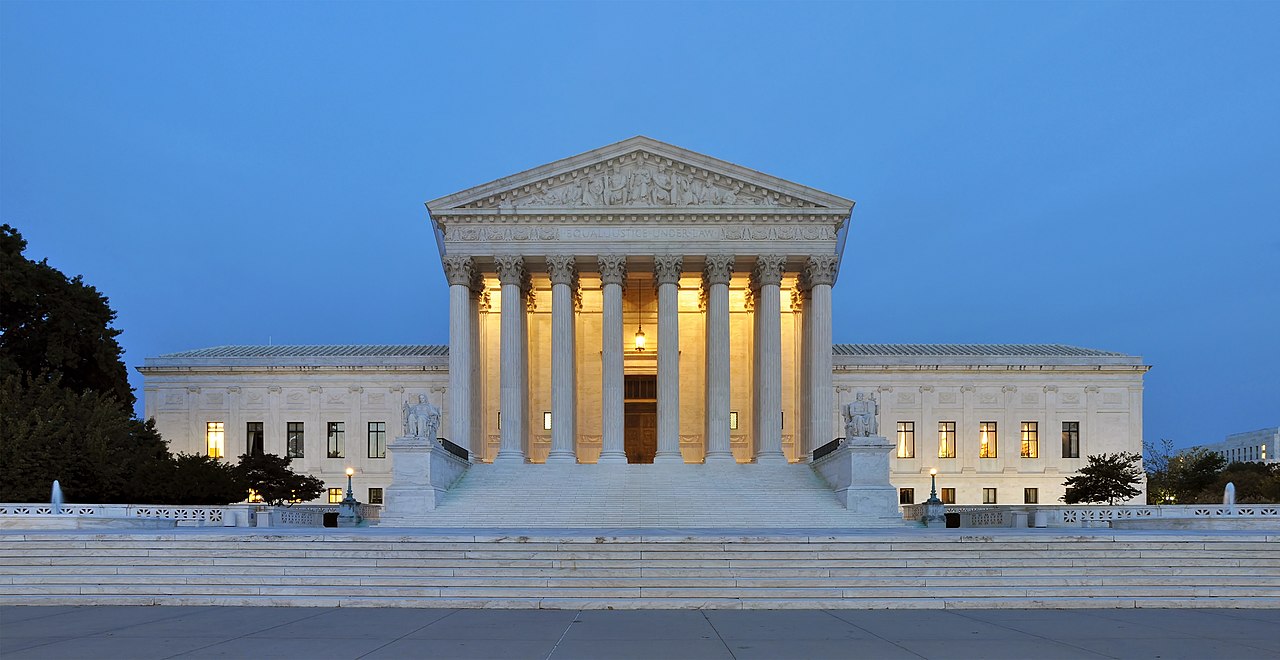News
Colorado voters seeking to disqualify Trump from the ballot tell Supreme Court Jan. 6 ‘will forever stain’ US history

FILE: The Supreme Court Building of the United States (Photo by Joe Ravi, CC BY-SA 3.0)
The plaintiffs seeking to remove former President Donald Trump from Colorado’s 2024 presidential election ballots filed their brief to the U.S. Supreme Court on Jan. 26, 2024. They asked the court to uphold the ruling by Colorado’s highest court that Trump engaged in an insurrection against the United States and, accordingly, should be disqualified from the presidential election under Section 3 of the 14th Amendment.
Trump “refused to accept the will of the over 80 million Americans who voted against him,” the brief filed by Norma Anderson and several other plaintiffs said. “Instead of peacefully ceding power, Trump intentionally organized and incited a violent mob to attack the United States Capitol in a desperate effort to prevent the counting of electoral votes cast against him.”
Anderson, a Republican and former Colorado state lawmaker, and several other plaintiffs had filed suit in September 2023 to keep Trump off the 2024 Colorado ballots. The Colorado Supreme Court’s conclusion that Trump was ineligible to appear on the ballot was appealed by Trump to the U.S. Supreme Court.
The 14th Amendment’s Section 3 bars those who have “engaged in insurrection or rebellion” from holding federal office.
The outcome of the case will likely determine if Trump can appear on ballots in states across the country.
Facts vs. assertions
Unlike Trump’s brief, which he filed with the Supreme Court on Jan. 18, Anderson primarily focuses on the facts, pointing out that Trump’s brief lacks any meaningful rebuttal of the “most damning evidence against him.”
Some of the “most damning evidence” that Anderson’s brief highlights includes how Trump “deliberately summoned to D.C. an angry and armed crowd who came ready to fight” and that Trump’s speech on the White House Ellipse “explicitly and implicitly incited the angry and armed crowd to imminent lawless violence.”
The Anderson brief describes how the Jan. 6 attackers “injured over 140 law enforcement officers, left one dead, and forced Congress and Vice President (Mike) Pence to flee for their lives.”
In his brief, Trump mainly argued that Section 3 of the 14th Amendment does not apply to the presidency because the president is not an “officer” of the United States under the Constitution. Trump’s brief also argued that Section 3 does not bar a candidate from running for office but rather bars the candidate from holding office, if elected.
And Trump asserted in his brief that “Calling for peace, patriotism, respect for law and order, and directing the Secretary of Defense to do what needs to be done to protect the American people is in no way inciting or participating in an ‘insurrection.’”
‘Monumental’ case
The Supreme Court will have several issues to consider in this case. The justices will have to address the legal questions presented by Trump, such as whether Section 3 of the 14th Amendment applies to the presidency. And the court will also have to answer mixed questions of law and fact.
Traditionally, the Supreme Court does not delve into questions of fact in the cases it considers – those facts are understood to have been established in lower court decisions. And while I initially stated that the court would not consider such questions in this case, I now join other constitutional scholars who believe the court will likely have to answer what constitutes an insurrection under the 14th Amendment, and whether Trump’s actions – or inactions – sufficiently meet that definition.
Perhaps the justices will turn to the history of the 14th Amendment to answer those questions. As Anderson’s brief points out, Congress and the states ratified the amendment, including Section 3, after the Civil War because they believed that oath-breaking insurrectionists could, if given the power of elected office, dismantle the country’s constitutional system from within. The 39th Congress considered Section 3 a necessary measure of self-defense – ensuring that those who had proven themselves faithless would be deprived of the political power to threaten the future peace and security of the United States.
But Section 3’s text may present the deciding factors for the court. Section 3 clearly states that “No person shall … hold any office, civil or military, under the United States.” It provides no language that appears to prohibit candidates from running for office.
Ultimately, Trump v. Anderson will be a monumental case. Regardless of its outcome, however, Anderson’s brief asserts that the “desecration of the U.S. Capitol by a mob of insurrectionists on January 6, 2021, will forever stain our Nation’s history.”![]()
Wayne Unger, Assistant Professor of Law, Quinnipiac University
This article is republished from The Conversation under a Creative Commons license. Read the original article.





















